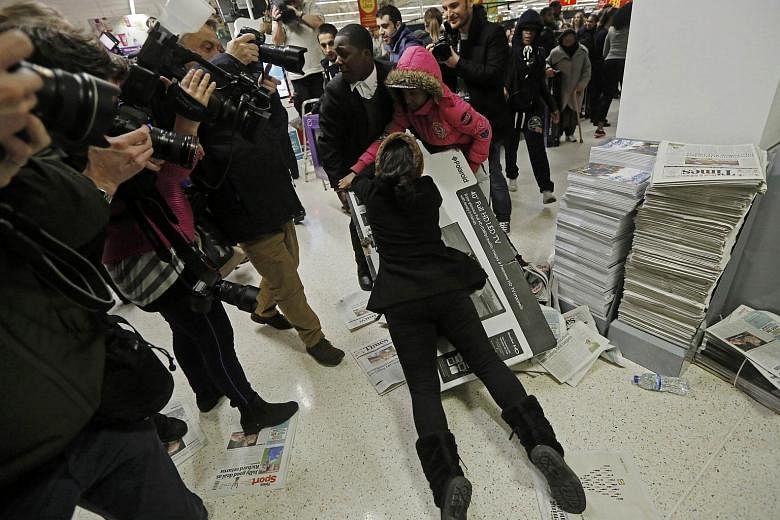1. Singapore's third quarter economic survey out this week
The Ministry of Trade and Industry (MTI) will release detailed data on gross domestic product (GDP) for the third quarter on Wednesday at 8 am, including a breakdown on how each sector of the economy performed.
MTI's flash estimate last month showed that Singapore only very narrowly missed slipping into a technical recession in the third quarter with the economy growing just 0.1 per cent quarter-on-quarter. Compared with a year earlier, third-quarter GDP expanded 1.4 per cent, according to the flash estimates.
But economists reckon that manufacturing likely contracted at a sharper pace in the quarter than the flash estimates implied. They also say that weak global trade volumes and strict foreign labour policies may cause MTI to downgrade its current forecast of 2 per cent to 2.5 per cent GDP growth for this year.
2. Thanksgiving in the US
US markets are closed for Thanksgiving on Thursday and stock markets close early on Friday. But the holiday-shortened week is offering a slew of US economic data - existing home sales figures on Monday, the second and final estimate for US third-quarter GDP on Tuesday and a snapshot of big-ticket spending in Wednesday's durable goods report - that will either make or break the case for a Fed rate liftoff in December.
For the most important GDP data release, economists see Q3 growth being revised up to an annual rate of 2.0 per cent from the initial estimate of 1.5 per cent.
US stock indexes have logged their seventh weekly win in eight weeks through Friday for two reasons: Fed officials' confidence in an improving economy and their assurance that rate hikes will come in a slow drip. Recent US economic data has also served to bolster the perception that the US economy is strong enough to withstand them.
3. Black Friday shopping
In the US, it's almost impossible to think of Thanksgiving, without thinking of Black Friday. The day after the US Thanksgiving holiday was so named because spending would surge and retailers would traditionally begin to turn a profit for the year, moving from the red into the black.
But while US shoppers are expected to spend slightly more this holiday season overall, nearly half of their average, estimated US$805 budget per person will be for online purchases, according to the US National Retail Federation. trade group's annual survey. Shoppers in Singapore and around the world will also be signing on to their Amazon and other online accounts for the best deals.
4. Europe's resilience in the face of terror
A series of consumer and business surveys out of France may offer early signs of European economic resilience in response to the latest terror attacks and threats.
Shares in airlines and hotel chains, including Air France-KLM and Accor, tumbled when trading began last Monday, but most recovered lost ground by the end of last week. The STOXX European 600 travel and leisure index was up over the course of the week, while the pan-European stock index hit a three-month high on Thursday.
France's state statistics agency INSEE will release its monthly business and consumer sentiment surveys on Tuesday and Wednesday respectively and both are expected to be unchanged. INSEE has said that its consumer survey will include only three days of responses in the past week to the Nov 13 attacks in Paris, representing around 7 per cent of all those surveyed. The bulk of business sentiment input will also be from the two weeks preceding the attacks. The full picture may only then emerge a month later.
But Commerzbank chief economist Joerg Kraemer noted to Reuters that even the Sept 11, 2001, attacks in the US barely dented its economy. ING chief euro zone economist, Peter Vanden Houte, said Paris hotels, restaurants and tourist sites might feel a pinch, but the overall short-term impact was likely to be muted. More significant, he said, could be the longer-term effect of increased security measures.
"There's a small positive in terms of government spending, but there's a risk of hampering international transport and free movement on goods and services," he said. "Could it push the ECB to loosen monetary policy? It's a further headwind, but they have already indicated they will do something in December."
5. Flash November PMIs
Beyond France, the coming week will kick off with flash purchasing manager indices for November for the euro zone countries, Japan and the United States, all seen broadly flat. October PMIs showed that euro zone business activity picked up by more than expected, US industry growth accelerated and Japanese manufacturing rebounded in a sign that they are shaking off the Chinese economic slowdown. Major indicators for China itself are not due until Dec 1.


